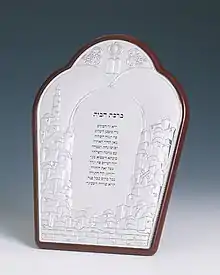
Birkat HaBayit (Hebrew: ברכת הבית, meaning Blessing for the Home) is a Jewish prayer often inscribed on wall plaques or hamsas and featured at the entrance of some Jewish homes. There are various versions of the prayer.
Text
| Hebrew | Transliteration | English Translation |
|---|---|---|
|
בִּרְכַּת הָבָּיִת: בְּזֶה הַשַּׁעַר לֹא יָבוֹא צַעַר. בְּזֹאת הַדִּירָה לֹא תָבוֹא צָרָה. בְּזֹאת הַדֶּלֶת לֺא תָבוֹא בֶּהָלָה. בְּזֹאת הַמַּחְלָקָה לֺא תָבוֹא מַחְלוֺקֶת. בְּזֶה הַמָּקוֺם תְּהִי בְרָכָה וְשָׁלוֺם. |
Birkat habayit: |
Blessing for the home: |
In the home, the Birkat Habayit is traditionally hung on the wall next to the front door or next to a window: it is meant to drive any evil spirits out of the house and protect the occupants within. Besides bringing a blessing upon the home, variations from around the world are also seen as brilliant works of art and are often given as housewarming gifts.
A Birkat HaEsek (ברכת העסק), "Blessing for the Business," is also popular in Israel.
Origin
There are conflicting theories as to the origin of this prayer.
Moshe Teitelbaum
There is a variation of it that appears in an amulet for protection against plague. This amulet is from 1925 and is attributed to Rebbe Moshe Teitelbaum.[1][2]
Modern Hebrew poetry
According to Rabbi Shlomo Aviner, the style of this prayer is not Jewish, as it has no "Yehi Ratzon" or "Ribbon Ha'Olamim" and does not address God in any way. He postulates that this prayer originates from a poem created by Rudyard Kipling, although there is no proof of this claim.[3][2]
See also
References
- ↑ "Birkat Habayit: Blessing for the Home". OpenSiddur.org. 18 November 2015. Retrieved December 13, 2019.
- 1 2 Abeles, Shlomo B (March 29, 2000). "Subject: Bircat Habayit". Mail.Jewish Mailing List. Retrieved December 13, 2019.
- ↑ Zivotofsky, Rabbi Ari Z. (2000). "What's the Truth About... "Rambam's Physician's Prayer"?" (PDF). Jewish Action. Retrieved December 13, 2019.